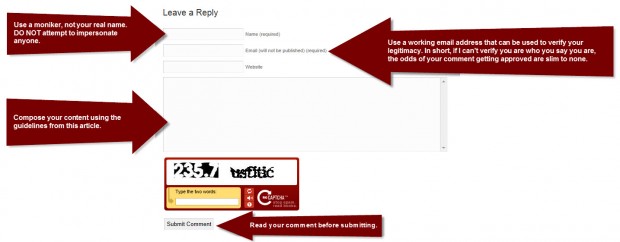Given the proliferation of contentious labor disputes over the past year, it shouldn’t come as a surprise that comments coming in to those respective articles can be filled with a great deal of passion and emotion. At the same time, those sorts of comments can be the primary reason behind making the respective author look like a thoughtless ass, which is probably not the sort of image they wanted to project.
As such, I have a few guidelines on how to leave a productive comment that doesn’t shy away from controversy or tough topics without simultaneously leaving the impression that you’re an insufferable twit with ears closed and mouth open.
 Character assassination for the sake of character assassination is counterproductive. Yes, you might be ticked off at a CEO, board member, or musician spokesperson for something they reportedly said or wrote but don’t post a comment which focuses solely on attacking character. Questioning professional competency (within limits) is all fine and good but even that’s a fine line. In most cases, the only thing accomplished with a personal attack is the comment author comes across looking like a raving lunatic bent on some sort of White Whale hunt.
Character assassination for the sake of character assassination is counterproductive. Yes, you might be ticked off at a CEO, board member, or musician spokesperson for something they reportedly said or wrote but don’t post a comment which focuses solely on attacking character. Questioning professional competency (within limits) is all fine and good but even that’s a fine line. In most cases, the only thing accomplished with a personal attack is the comment author comes across looking like a raving lunatic bent on some sort of White Whale hunt.
Cite your sources. I can’t stress this one enough but if you are going to excerpt something attributed to an individual or group associated with a labor dispute then be sure to cite your source; newspaper, press statement, website, foundation study etc. At the bare minimum, this includes a link to the original material and at best you’ll include the source title, author, publication date, and link. For example: the 9/14/2011 edition of Adaptistration.com by Drew McManus; https://adaptistration.com/?p=9823.
Be firm, but civil. Don’t disrespect another comment author for no other reason than you disagree with his/her opinions. Feel free to point out perceived errors in judgment, facts, thought process, etc. but avoid the temptation to attack an individual’s character for no other reason than disagreeing with their sentiment.
Don’t abuse the privilege of anonymity. I maintain strong positions on the issue of anonymous comments; in short, I’m pro anon. At the same time, that doesn’t excuse anyone from abusing what still boils down to a privilege, not a right. Be sure to read the section below on how to properly leave an anonymous comment. Otherwise, if you’re sending something in just so I can read it, save yourself a step and visit the contact page.
Avoid the Seven Deadly Sins of Culture Blog Commenting. I published a list of general culture blog comment transgressions back on 11/4/2010 and it continues to serve as a resource on basic comment etiquette.
The Right Way To Leave An Anonymous Comment
Just use the following guidelines:
In the end, if you have a questions about the process (which is now part of the official comment policy), just ask.


